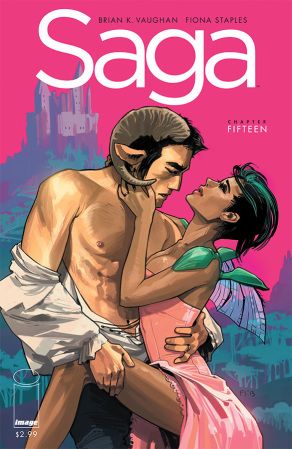[Editor’s note: Each Sunday, Robot 6 contributors discuss the best in comics from the last seven days — from news and announcements to a great comic that came out to something cool creators or fans have done.]
In some ways, this is the best of times and the worst of times for those who are interested in bringing comics to a broader audience. As the hubbub died down over Milo Manara's Spider-Woman cover, another story went viral, about a comic shop where an employee allegedly made a crude joke about a "rape room" and then fired a trainee who complained about it. While debate continues to rage over what exactly happened there (the store owner denies it), Bloomberg did a big story on how the number of women comics readers is growing and becoming an ever more important sector of the industry.
With this in mind, I want to call out three things that happened this week.
The first is Gene Luen Yang's speech at the National Book Festival. First of all, it's impressive that a comics creator is given such a prominent platform at an event that isn't actually focused on comics. What Yang had to say was even more impressive. He spoke about the African-American creator Dwayne McDuffie, whose love of comics first caught fire when he encountered the Black Panther, a black character created by Stan Lee and Jack Kirby. The Black Panther wasn't perfect, but, Yang said,
All of these flaws were lost on Dwayne McDuffie when he first encountered the Black Panther in 1973, at the age of 11. What struck him was the character’s commanding sense of dignity. The Black Panther wasn’t anyone’s sidekick. He wasn’t an angry thug. He wasn’t a victim. He was his own hero, his own man. As Dwayne describes it, “In the space of 15 pages, black people moved from invisible to inevitable.”
Yang had a similar experience when he discovered the character Xombi, an Asian-American lead character who did not know kung fu. Again, Xombi was not created by Asian-Americans, but that's exactly Yang's point: "After all, our job as writers is to step out of ourselves, and to encourage our readers to do the same." He acknowledged that can be scary, and that the creator runs the risk of making mistakes and being beat up for it on the internet. "If this happens, take comfort in the fact that even flawed characters can inspire," he said. "Apologize if necessary, resolve do better, and move on."
Last night, Gail Simone stepped forward to give the keynote address at the Harvey Awards, and like Yang, she talked about her childhood love of comics. Heidi MacDonald paraphrased her speech:
But by the time she graduated to the spinner rack, it seems comics had given up on girls. The women were in bikinis or a hostage. A cousin told her that comics weren’t for girls. There were no romance or teen books. Like most children she didn’t know about comics beyond the 7-11, She went to a comics shop and discovered Elfquest and Cerebus and other comics, best of all, Love and Rockets some starring women and even created by women.
When she created the Women in Refrigerators website 15 years ago, Simone said, she was attacked for it. “Imagine that your website gets national attention and makes the whole industry look like sexist jerks," she said. "Your inbox would look like ebola hit Krakatoa. I got hate mail and I still do." Nonetheless, she has gone on to become a prominent creator in her own right, and she closed her speech with a recital of hopeful signs: Strong sales for Pretty Deadly and Lumberjanes, two comics by women creators; the Valkyries, a group of women who work in comic shops; and an anecdote about a little girl who was thrilled to get a copy of Simone's new Wonder Woman comic.
And then the third thing happened: Saga, a comic with a male and a female creator and a strong female lead, took four Harvey awards: The award for Best Continuing or Limited Series, the Best Writer award for Brian K. Vaughan, and the Best Artist and Best Cover Artist awards for Fiona Staples. These will have to share shelf space with the Eisners they won in July.
The continuing success of Saga, both in terms of sales and awards, is evidence that there is room in the comics market—yes, even in the direct market, which has structural incentives to be conservative—for a good yarn with a female lead. That doesn't mean there have to be less of the other kind of comics, and it's worth noting that a number of quality comics by male creators, with male lead characters, also won Harvey awards last night. Bringing in more diverse creators, characters, and storylines means presenting potential readers with more opportunities to fall in love with comics, and expanding the audience is good for everyone.


